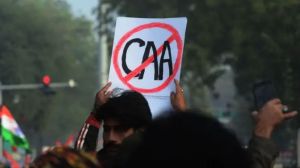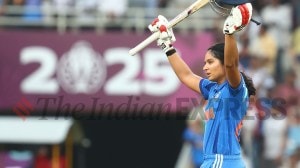Sex No Bar
The tension between two young girls in a Hyderabad household. An idealistic civil servant’s encounter with reality. An unsuccessful mus...

The tension between two young girls in a Hyderabad household. An idealistic civil servant’s encounter with reality. An unsuccessful musician’s relationship with his prodigy. It’s to break cliches on ‘women’s subjects’ that Lillete Dubey is presenting Womanly Voices. The theatrical presentation, which premieres on June 6, is based on the anthology, Women Writing in India: 600 BC to Today.
“I received the two volumes as a birthday gift about eight years ago,” reveals Dubey, who finally began working on this project about a year ago. “I wished to highlight how women’s writing encompasses such a wide range of subjects. There’s nothing soft or sentimental about it,” declares the director, explaining, “Apart from the potential to be dramatised, I opted for stories with strong themes — subliminal, yet layered. Despite the loss in translation, they have distinctive voices.”
She finally zeroed in on Wajeda Tabassum’s Utran, Mahasweta Devi’s Shishu and Gita Mehta’s The Teacher’s Story. Utran — the take-off point for Mira Nair’s Kamasutra — is a seemingly simple tale about the dynamics between two girls. “But it also makes a strong statement on class conflict,” Dubey puts in, adding, “We simply couldn’t source the original Urdu text in any bookstore. We finally copied it down from a library.” Shishu is a hard-hitting look at the tribal belt of Bengal-Bihar and a civil servant who’s out to fix everything. “It’s almost masculine in its approach: direct, non-emotional, biting,” she feels. In contrast is the lyrical world of Sufi music in Calcutta, The Teacher’s Story, about a boy with the voice of an angel.
The adaptations evolved through workshops with actors. “But I already had the visual presentation in my mind’s eye. I didn’t want to resort to a sutradhar for narrative passages… some translated into conversations,” she says. She has introduced other theatrical devices, like the alter ego in Utran. And The Teacher’s story is seen through the eyes of a minor character, “whom even Gita had forgotten!”
Her cast — Shernaz Patel, Suchitra Pillai, Joy Sengupta, Vikrant Chatturvedi and Neha Dubey — now includes Dubey’s younger daughter Ira, on vacation from her Theatre Studies course at Yale. “Everyone plays multiple parts, regardless of age or gender,” she says about the largely English play, with Hindustani interludes. Mahesh Mehbubani has created some “primitive choreography”. And Mahesh Tinaikar has composed an original score, capturing the varied ambience of each story — through qawwalis, dohas and ragas. “The last piece has 13-year-old Pratik Rao giving an
amazing rendition of a Rumi poem,” reveals the director, who emphasises music
in her plays.
After shows through June in Mumbai, Dubey’s taking it to New Delhi, Pune, Bangalore and Hyderabad. While stagings of her Mahesh Dattani plays — Dance Like A Man and Thirty Days in September — continue, she also has a full film platter: Pinjar, Baghbaan, Chalte Chalte, Kal Ho Na Ho, Morning Raga, Laksh. “I can’t begin shooting my first feature film (which Dattani is currently scripting) till 2004,” she sighs. Yet she’s particularly excited about Pinjar, based on Amrita
Pritam’s pre-Partition novel: “I’m a rural Punjabi mother, who’s pregnant through most of the film!”
But before that, there are two more theatrical productions waiting in the wings: Dattani’s new play and Pratap Sharma’s Zen Katha. “The older I get, the more I seem to take on,” she laughs, “But that’s the way I like it… stepping it up all the while.”



- 01
- 02
- 03
- 04
- 05




























